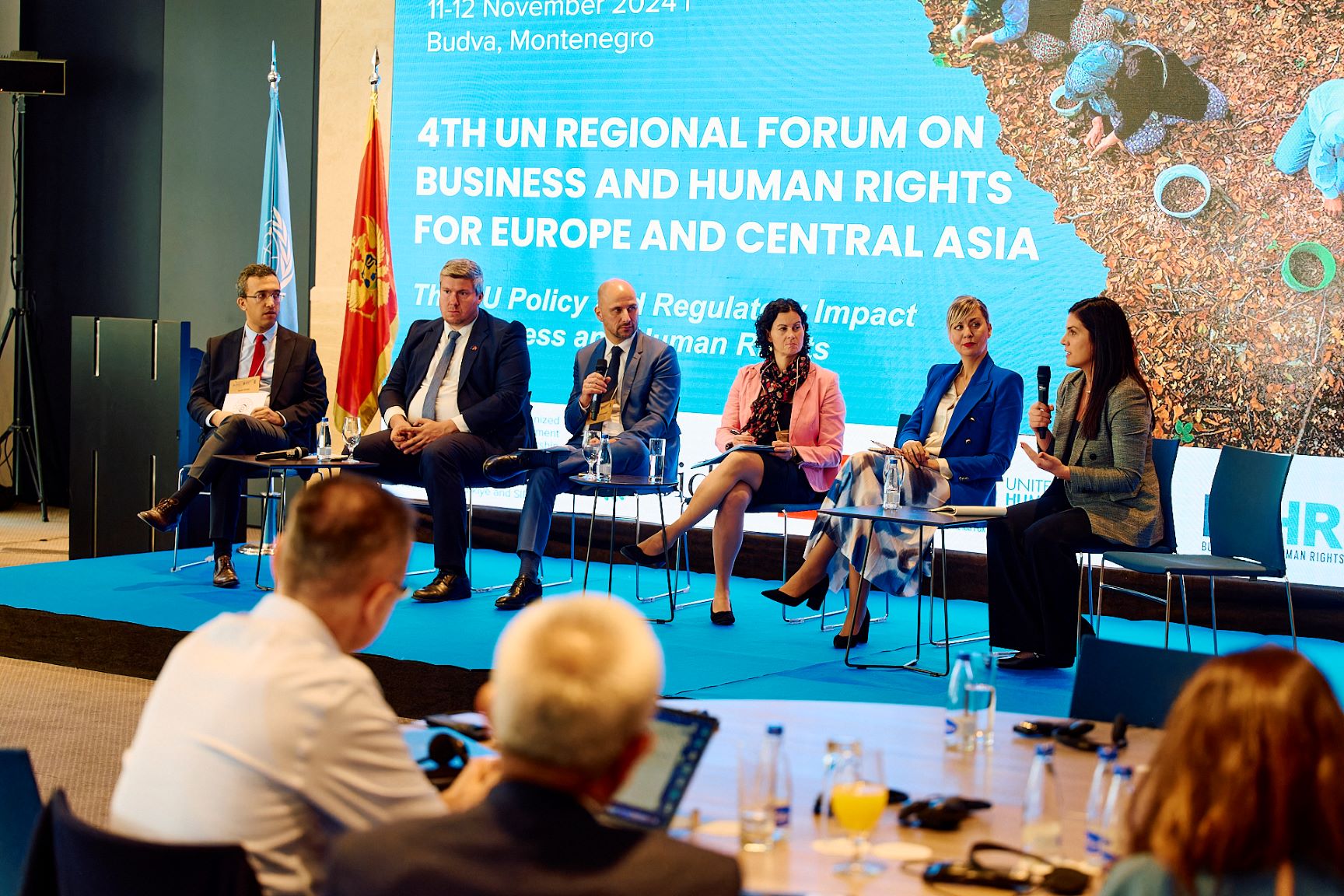Respect for human rights as an essential component of national regulations and business practices
November 12, 2024

Budva, November 12, 2024 – The development of national regulatory frameworks on business and human rights requires cooperation between governments, civil society, and relevant partners to integrate human rights and sustainability standards into business activities. This was emphasized at the UN Regional Forum on Business and Human Rights for Europe and Central Asia.
In Budva, over the past two days, representatives from international organizations, governments, industry, national human rights institutions, and civil society organizations from across Europe and Central Asia gathered to exchange experiences, identify challenges, and make progress in advancing human rights within business activities. The forum was organized by the United Nations Development Program (UNDP) Istanbul Regional Hub and UNDP Montenegro Country Office in partnership with the UN Working Group on Business and Human Rights. Key topics included the impact of the UN Guiding Principles on Business and Human Rights and recent regulatory developments at the European Union level, notably through the adoption of the Corporate Sustainability Due Diligence Directive.

UNDP Resident Representative in Montenegro, Ekaterina Paniklova, highlighted the significant strides made by countries such as Bosnia and Herzegovina, Georgia, Kazakhstan, Kyrgyzstan, Serbia, Türkiye, and Ukraine in developing national strategies for implementing the UN’s principles and integrating human rights into business processes.
“These efforts show a growing commitment by countries to make human rights and sustainability key elements of business practices. However, challenges remain, as many countries still have inadequate worker and environmental protection policies. As a long-standing partner to countries in the region, UNDP plays a crucial role in supporting the development of national action plans on responsible business conduct. Through initiatives like the UNDP Academy for Business and Human Rights, we have already trained over 400 companies”, Paniklova stated.
The forum emphasized that the recently adopted EU Directive could drive changes in business practices by encouraging companies to responsibly manage how their activities impact human rights and providing remedy avenues in cases of rights violations. Although a small number of companies in the region will be directly affected by the Directive, many will be encouraged to adopt sustainable practices through connections with major EU companies.
The forum provided a platform for collective reflection and strategic planning to help countries and companies in the region respond to new requirements and improve accountability for human rights in business practices. Representatives from the UN Working Group on Business and Human Rights, the EU, and the Montenegrin government stressed the importance of aligning regional legislation with EU standards, which would further strengthen political and economic ties with the EU.

Montenegro’s Deputy Prime Minister for Economic Affairs and Minister of Economic Development, Nik Gjeloshaj, emphasized that human rights are the inherent freedoms and rights of every individual, regardless of nationality, age, gender, or religion. He also highlighted how business activities impact millions of lives worldwide, serving as powerful drivers of sustainable development and social and economic progress.
“However, we must be aware of the potential impact these activities can have, especially on vulnerable populations. The role of companies in supporting and protecting these rights is crucial, and it is our role as a society to continually remind them of the importance of respecting these rights. Protecting every individual from potential human rights violations is a fundamental duty of our government, and it must be upheld. This requires preventive and corrective measures to avoid human rights violations through effective policies, laws, and decision-making processes,” he stated.

“For any policy or legislative advancement in the field of human rights to have a positive impact, three key elements are necessary: multi-stakeholder dialogue that includes rights holders, particularly the most at risk; effective and accessible accountability mechanisms; and demonstrated political will for change. Mandatory corporate due diligence measures bring significant benefits to businesses, including legal certainty, level playing field, and reduced risk of litigation for negative impacts on human rights and the environment” stressed Lyra Jakulevičienė, in her capacity as Vice-chairperson of the United Nations Working Group on Business and Human Rights, which is mandated by the UN Human Rights Council to promote the dissemination and implementation of the United Nations Guiding Principles on Business and Human Rights (UNGPs).

In his video message, EU Special Representative for Human Rights Olof Skoog stressed the growing importance of business sector accountability in the protection and promotion of human rights.
“The private sector plays a key role in addressing social challenges, and businesses should shift from a ‘do no harm’ principle to actively promoting human rights. EU legislation plays a vital role in ensuring that companies respect human rights and environmental standards, with implications for countries beyond the EU. This is why partnerships between the EU and organizations like UNDP are important, as national action plans on business and human rights being developed by some countries in the region, with UNDP’s support, can provide a valuable framework for securing support from all stakeholders,” he said.

Forum participants also discussed the region's needs and capacities for implementing the UN Guiding Principles (UNGPs) and relevant EU legislation, emphasizing the resources required to support these efforts. They welcomed the organization of a 5th Regional Forum in 2025 as an important opportunity to sustain meaningful engagement and foster constructive dialogue on business and human rights across the region.

 Locations
Locations



